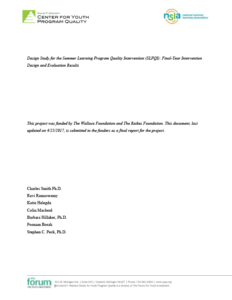The Summer Learning Program Quality Intervention (SLPQI) is a continuous improvement intervention for summer learning systems and settings. The intervention includes: (a) standards and measures for high-quality instructional practices, (b) data products and technology for meaningful feedback, (c) a plan-assess-improve cycle at each summer site, and (d) supports necessary to design and implement the prior three parts. The SLPQI focuses on instructional practices that build student skills during summer and increase school success during subsequent school years.
The SLPQI was the subject of a four-year Design Study involving 152 providers in seven cities. In the final year of the study, the SLPQI was implemented citywide in Denver, CO; St. Paul, MN; and Seattle, WA (N = 106 sites). This report presents final specification of the SLPQI design, supports, measures, and performance benchmarks.
Key findings include:
The SLPQI was implemented at moderate to high fidelity, at scale, in three citywide systems with local provision of supports. The proportion of sites implementing the SLPQI at high fidelity was high in all three systems, and partnerships of school districts, city agencies, community-based providers, and quality intermediary organizations developed capacity to implement the SLPQI at scale. A large proportion of non-school-based sites were connected with information about students’ success in the prior school year.
Summer program staff positively valued the SLPQI and the assessor-coach role. System leaders, site managers, and assessors reported that implementation of the SLPQI was a good use of their time and a good fit with their work. They also reported that the Summer Learning Program Quality Assessment (PQA) successfully differentiated between higher and lower quality. Staff valued of the assessor-coach who observed, generated performance feedback, and provided coaching for the site manager.
Performance data indicates that instructional quality and student outcomes improved as predicted by the SLPQI theory of change. Performance data indicates that instructional quality improved from 2015 to 2016. Lower-performing sites improved the most, and high performance was sustained. Innovations were focused on identified areas of low quality: student management of their executive skills, motivation, and emotions. Students in higher-quality summer settings had greater academic skill gains in both 2015 and 2016 compared to students participating in lower-quality summer settings.
Recommendations include (a) marketing the SLPQI in cities with strong summer partnerships; (b) marketing SLPQI to school districts that hope to build summer partnerships; (c) continuing efforts to improve the Summer Learning PQA as a standard for high-quality instruction tailored specifically for students with difficult SEL histories, and (d) conducting a randomized efficacy trial for the SLPQI.
